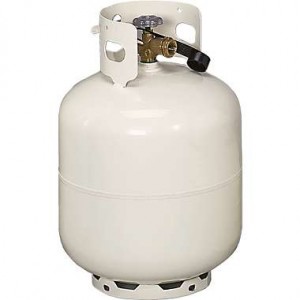by Guest Author Ted Blanchard
Generator Fuels
Different types of generators are designed to run on fuels that may include, gasoline, propane, natural gas and diesel. Don’t get one that runs on electricity though (that’s a little joke, folks). For the sake of brevity, I won’t go into water-powered or gasified wood-powered generators. Battery started engines are just fine and make the use much more enjoyable. Some generators can be modified to run on something other than their original design fuel, and some can selectively run on more than one type of fuel. These are not very common and potentially add complexity to the system that could translate to shorter life span or undesirable operation, but properly configured tri-fuel (propane, natural gas and gasoline) generators provide flexibility and can make sense in some circumstances. The dry fuel “carburetor” does not add much complexity but, as with all things, the KISS principle applies.
I’m going to generalize here and will likely incur the wrath of several readers by slighting their favorite form of fuel. Too bad. I’m writing and you’re reading it (at least as far as this point) so give me some additional time and I may manage to lessen your anger.
Gaseous fuels– propane and natural gas (Nat Gas) – have distinct advantages, not the least of which is an incredible shelf life. A tank that is kept free of leaks should hold your propane or Nat Gas supply in a usable state for longer than you live. On the down side, plumbing can be tricky and if you do develop a leak, your first indication may be when you house is “remodeled” by the force of the explosion as the leaked gas reaches an ignition source. Propane is heavier than air and can creep along the ground until it finds a spark or flame. Nat Gas is lighter than air and so tends to waft up and away from the tank. Small comfort, however, if it encounters a spark from a chimney or a static discharge from anything that it finds nearby, even many hundreds of feet away. Natural Gas that is distributed in the gaseous state is considered to be part of the grid, with the associated vulnerabilities. All that said, gaseous fuels as a generator supply are still a good choice, if proper care is used in selecting the placement of the tank and in running the plumbing to the generator. Gaseous fuels have a decent specific energy and so is generally a cost effective fuel, but this will depend on your location and how much the rates change between seasons. Here in North Idaho, propane was a delightful $1.40 per gallon this summer, but climbed very rapidly to $2.05 so far this winter and will probably go up even more several times in the coming months. Generators that use gaseous fuels are often very quiet compared to gas or diesel powered systems and that is a distinct advantage if you want to run your generator overnight. Availability in normal and abnormal times must also be considered. Will your propane supplier keep refilling your tank if we have a TEOTWAWKI event? If not, do you have the means to go get some at the supplier – assuming they are still selling it?
Liquid Fuels
 Gasoline and diesel each have their own good and bad points. We’ll start with gasoline. Typically affordable and available almost anywhere, we drive our gas-powered cars without giving too much thought to where we will fill the tank when it approaches empty. We will simply stop at a station that is convenient and sells at a price we are willing to pay. Several grades may be available, but generators typically do not require anything better than the lowest grade, with an octane level of 87
Gasoline and diesel each have their own good and bad points. We’ll start with gasoline. Typically affordable and available almost anywhere, we drive our gas-powered cars without giving too much thought to where we will fill the tank when it approaches empty. We will simply stop at a station that is convenient and sells at a price we are willing to pay. Several grades may be available, but generators typically do not require anything better than the lowest grade, with an octane level of 87i.
Gasoline does not store well for long periods of time. Since it contains several very volatile compounds that separate out of the solution and evaporate given half a chance, fuel that you count on for emergencies should be rotated regularly and even treated with a stabilizer such as “Sta-Bil.” I’m not recommending them over other providers or products but they have become something of a “household” name. I do not like the fact that they charge what I consider to be exorbitant prices for what is, chemically, an inexpensive formula. Nevertheless, properly treated, sealed and stored gas can exhibit a useful shelf life of up to two years. Beyond that you are slowly transitioning to gunk. Engines do not run well on gunk. To get the best possible shelf life, keep three things in mind. (1) Store the fuel in an air- and liquid-tight container with as little air in the container as possible (to prevent moisture condensation), remembering that gas expands and contracts significantly when the temperature changes so don’t chance bursting a thin-walled container by leaving zero air space. (2) Keep the fuel away from light, which can cause heat-induced expansion and also speeds up the chemical decomposition process, and (3) make sure the gas is not subject to wild temperature swings in either direction, which also speed up the decomposition process and may overcome the integrity of your storage container. Anecdotal stories of shelf life longer than 2 years may be true. I wouldn’t count on it, in fact 2 years is really pushing it in my estimation. That’s why you should rotate your emergency supply every year if possible. Use the stabilized one-year-old gas in your car, boat or other engines. Treat and store the next batch. Make sure to put the date on an attached slip of paper. Remember that as gasoline ages its octane rating decays so it might make sense to store a higher octane fuel. Some will argue that properly stabilized low octane gas is sufficient and that may well be the case.
Gasoline vapors explode. That’s why your car, boat, and generator engines work. Improper storage of gas can result in leaks that pose a significant fire and/or explosion hazard. Gasoline composition is important. Automobile gasoline (every grade) is increasingly treated with ethanol, up to 10% (and up to 85% in the case of ethanol multi-fuel). This have some dubious benefits to the environment and cost of production, but it has one very clear drawback, which is one of the reasons why I tend to lean toward diesel generators. Ethanol attracts moisture. The technical term is hygroscopic, if anyone cares. Ethanol literally sucks water vapor out of the air. This water may or may not be visible in a tank used to store your generator’s fuel supply, but unless very specific steps are taken to reduce or eliminate the water before it reaches your generator you can end up with both short term and long term problems. Water will alter your consumption rate, usually for the worse. When water is absorbed into gasoline it can form corrosive compounds that damage engine components. Water left sitting in fuel lines, carburetor bowls, injection systems and so forth can make the engine hard to start, maybe even impossible, depending on how long the unit sat with old fuel in it. Leaks in hard fuel lines are a common result of trapped water sitting for long periods.
Now we’ll cover diesel fuel. Also available in several “grades,” diesel is formulated for variable speed engines operating at normal temperatures, cold temps, and also for near-constant speed engines. Trying to start an engine with diesel formulated for normal temps when the engine and surrounding air is very cold can be a frustrating experience. Road diesel gels at cold temps and may not be easily pumped through the system, so low temp formulas are warranted in colder regions. All on-highway diesel fuel in the US is now Ultra-Low Sulfur diesel (ULSD) <15 ppm and there may be issues with older engines not engineered for ULSD. For a complete description of the various diesel grades and their positions in the spectrum of refined petroleum products, please see this piece.
Diesel exhaust is typically white and dense when the engine is cold and turns almost clear as it gets warm, though this can shift to grey or even black if the engine is under very heavy loads. Good quality diesel generators are designed to deliver their rated power without reaching this engine loading point, but some people do not like the smell of diesel fumes at all, and it’s a definite consideration when choosing your generator and fuel combination.
Diesel has a significantly longer shelf life than gasoline, with 8-, 10-, and even 12-year old fuel still working satisfactorily. To get the best results, depending on your location and engine type, you may need to treat the diesel with some combination of a cetane booster, an anti-gel product and/or a biocide. Seems a fair number of algae and microbe species like to eat diesel fuel and they can foul it beyond recall if not kept in check. An obvious sign that you have an algae or microbe problem is that the fuel becomes extremely murky, or even black. The biocide keeps the bacteria from attacking your fuel. Mix it in well with a paddle or stir stick. Warmer climates are more prone to infestations and cold climates may not require any biocide treatment at all. Higher speed diesels (e.g. 3600 RPM vs 1800 RPM) operate more effectively with higher cetane number fuels. Anti-gel additive helps keep your fuel flowing well in colder temps and keeps the diesel stabilized. Diesel is nowhere near as bad as gasoline in this respect, but it is still wise to prevent problems that you can easily avoid. Diesel is much safer than gasoline since the vapors will not explode or even burn at normal air pressure. You can throw a lit match into a coffee can with an inch of diesel in the bottom and the match will be quenched immediately. As a result, the long-term storage of diesel fuels is simpler and safer than with gasoline. Don’t be careless, however, as almost any materials lying around will burn much better if they have diesel on or in them. Diesel still likes the same handling as gasoline: air and liquid-proof containers, dark storage areas (this also inhibits microbe growth) and near constant temps. Underground storage is ideal, but not essential. While diesel does not attract moisture nearly as much as ethanol-treated gasoline, diesel engines hate water in the fuel and may not run at all if badly contaminated. A good quality water-block filter, in line between the tank and the engine, solves this easily. Keeping an emergency supply tank full is always a good idea since water vapor-bearing air can’t condense out and contaminate the fuel.
To be continued…
Back Up Power Generators Part I
Back Up Power Generators Part III





14 Comments
Michelle Woodruff · December 29, 2009 at 10:51 pm
What is your opinion of a solar-powered generator? I’ve seen a few of them advertised online. Are they worth it?
Sherry · December 30, 2009 at 12:14 am
$2.05/gal on propane sounds REAL good to me………….we are paying $2.45/gal and it’s going up again.
S. Willhouse · December 30, 2009 at 12:15 am
I notice that you do not mention solar powered generators…. I have purchased a small solar panel back in July and I have been battling my home owners association ever since – in my effort to install on my garage roof.
jamie · December 30, 2009 at 8:36 am
I’m not sure on Diesel generators, can they run on a bio-diesel? Kellene
Willhouse I have seen a few Solar generators for RV’s and campers. very small and compact and not made for a permanent setup. You may do better with some thing that you can put up, take down, and move.
You maybe able to check with your city codes and install them and bypass the HOA. Not sure but lots of zoning rules are changing, plus you could take it to the media and show they aren’t being green and playing NIMBY.
Andra · December 30, 2009 at 3:53 pm
Back-up Power Generators Parts I and II are very detailed and informative! Studying several alternative energy sources is essential to decide how best to prepare, and this series is excellent. After our own search and experiences, we decided on an “indoor” generator which is a parallel series of no-maintenance deep cycle marine batteries and two inverters (one to handle small loads, the other larger loads). Our system will provide us about 3-4 days energy for calculated basic needs. To recharge, we have a small fuel powered engine/alternator that will fully charge the batteries in 4 hours with 1 gal fuel. We plan to add a solar panel as a back up charger. A custom built cabinet encases our set-up so it just looks like a piece of furniture.
Ted Blanchard · December 30, 2009 at 5:16 pm
Hi – I’ll try to answer the questions posed. Some of them may be answered in the 3rd segment I submitted, if that gets posted.
Solar power systems are excellent if (1) you have a steady supply of sunshine, (2) you have the finances to procure and install one, and (3) your electrical needs are modest, because most commercially available solar systems provide hundreds of watts, not thousands of watts. Details of the pros and cons probably warrant a separate article, but there is a lot of information already out there to get you started in evaluating them. Yes, homeowners associations and such can be a hurdle since some people consider the collectors to be an eyesore. There ARE ways around that and I hope to elaborate more on that later.
Since the article was written, our propane price went up, too, and is now at $2.20/gal and I’m certain it will go up again, perhaps several times before Spring.
Diesel generators can generally run on bio-diesel, but they will require a fuel pre-warmer or a switch-over system that lets you start and warm up the engine on standard diesel fuel and then run it on bio-diesel after it’s warm. Some diesel generators will even run on heating oil though the cautions about biocides and cetane levels apply to both these alternate fuels. Don’t forget that insufficient lubricating qualities of some fuels will adversely effect your engine.
“Indoor” generators are also an excellent power source for limited load situations, as long as all safety issues are properly handled (e.g. hydrogen gases created by the batteries – they are potentially explosive). As the commenter noted they can provide several days worth of basic power from deep cycle marine batteries and inverters. The main drawback is that they require some other source of electrical power to recharge, when the batteries have been drawn down. That source can be solar collectors, but this approach will have fairly lengthy charge times. A gas driven generator can be used to recharge the batteries, as noted, but now the shelf life of the fuel used comes into play if the power outage is extended (or semi-permanent).
No single solution is perfect for all situations. Hopefully the information provided will assist in making an educated selection that best fits your own scenario
Adam · December 31, 2009 at 3:31 pm
Mr. Blanchard,
In the notes, you said bio-diesel needed to be warmed to be able to run a diesel engine. This needs to be corrected. Bio-diesel does not need to be pre warmed to run a diesel engine it’s the Waste Vegetable Oil (WVO) that bio-diesel is made from that needs to be pre warmed to run a diesel engine. Bio-diesel was made to be an alternative fuel for diesels just like ethanol (E85) was made to be an alternative fuel for a gasoline engine. Just like E85, bio-diesel is corrosive to rubber parts in a fuel system. Those rubber parts in the fuel system need to be replaced with silicone to prevent fuel system leaks.
Thank you
jamie · January 1, 2010 at 1:29 am
Thanks for the info guys, I did not know Bio-diesel could be corrosive.
Alex H. · January 4, 2010 at 2:05 am
Regarding a “generator that runs on electricity” there are such things. Such generators are used in computer rooms when line noise from the grid is a problem. Line noise causes problems with computers as Kellene pointed on in an earlier posting on EMP (Electro-Magnetic Pulse). Spikes in the line can reek havoc with sensitive equipment, changing data and even destroying computer circuits. Companies would (and may still) install a generator that is run by an electric motor. This isolates the electronic equipment from any problems with the grid and allows one to control the power quality coming in. In an EMP event, one could build a house out a cube of aluminum, and bury it 50 feet into the earth but this will do you no good if the electric line from the pole coming in is carrying an EMP spike into your equipment. You need to isolate from the grid or live with the spike.
Frankly, this is really expensive and on the list of priorities I can think of a lot more important things than maintaining such stringent electrical isolation… like… for the price of an electric-electric generator you could buy a very elaborate radio, computer, and TV and store it all in a grounded metal box so unless you are trying to protect a backup satellite control center or a NASA communications hub, I’d say forget it for the normal prepper. I simply wanted to say there are serious reasons for wanting a generator that runs on electricity.
Of course, once the grid goes down, you will still need the fuel-based generator.
Adam · January 4, 2010 at 2:05 am
Jamie(or anybody else)- If you want to learn more about biodiesel and WVO there’s alot of great books out there, but one of the books that had a little more info was “how to make biodiesel” by Dan Carter, Dave Darby, Jon Halle, and Phillip Hunt
jamie · January 15, 2010 at 6:12 am
Thanks for the ideas guys. I actually have 2 generator both gasoline. 1 RV and one free standing. I may be able to trade it for something I really need.
I am getting ready assuming there will not be fuel, electricity, water and sanitation. I like the idea of solar but it’s to darn expensive for what you get for power output. So it’s back to the 19th century for ideas that are good for me. Burlap coolers, and I’ve seen the same principles of evaporation on Terracotta pots.
It’s funny we think it people are civilized and so many times it’s just our gadgets and infrastructure.
bowking · December 7, 2010 at 12:02 pm
I think that this is a big help in saving money,the Solar Power Generator. Read more from it in sunpowerportcom
(Kindly give a dot between letter T and C. Thanks). Have a great day. 🙂
shachar ivash · April 25, 2014 at 8:29 am
Hi guys,
Hi guys,
How can I learn more about a generator that runs on heating oil? what are the exact demands?
Preparedness Pro · April 30, 2014 at 3:30 am
I’ve never even heard of a
I’ve never even heard of a generator that runs on heating oil. I’m sure it’s out there somewhere though, but I prefer propane, diesel, or solar, so I’ve never looked into heating oil generators.
Comments are closed.